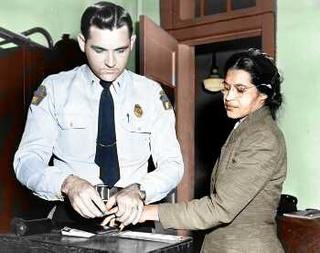Monday, December 19, 2005
A Clear and Present Danger
Dialogue between a fictional president and the other kind.
FP: “You broke the law. You’re going to jail.”
OK: “You are such a boy scout. You see everything in black and white.”
FP: “Not black and white. Right and wrong.”
OK: “I am not a crook.”
Oops, for some reason I keep reverting to that previous other kind of president.
FP: “You broke the law. You’re going to jail.”
OK: “You are such a boy scout. You see everything in black and white.”
FP: “Not black and white. Right and wrong.”
OK: “I am not a crook.”
Oops, for some reason I keep reverting to that previous other kind of president.
Sunday, December 18, 2005
The Slave is Our Brother
In a morning marked by the dissension and controversy about an increasingly unpopular war, I was pleasantly surprised to learn in church this morning the background of one of my all-time favorite Christmas songs, Oh Holy Night. Considering myself to be well-versed on the social aspects of the gospel, I was intrigued to hear that the song was written by a socialist wine-seller, the music by a Jew, and the English translated by an ardent abolitionist. The song premiered at midnight mass on Christmas 1847 in Roquemaure, France. Even though it was a very popular Christmas song in France, at one time it was banned for use in catholic churches. The problem with the song was that the author, Placide Cappeau, had became, according to one web-site, " a social radical, a freethinker, a socialist, and a non-Christian." The article goes on to say that later in his life, "he adopted some of the more extreme political and social views of his era, such as opposition to inequality, slavery, injustice, and other kinds of oppression." Certainly doesn't sound very Christian by many of today's definitions.
John S. Dwight translated it into English in 1855. Dwight was a Transcendentalist, a "commune"ist (see Brook Farm, MA), an abolitionist, and one of the foremost critics and proponents of classical music of his day. The song was very popular in the churches of the North during the civil war for obvious reasons.
There is a great deal of folklore which has been attached to the song. It is credited with being the song sung to begin the Christmas day truce of the Franco-Prussian War. It may have been the first song ever broadcast by radio. It was sung by me at one of my earliest public performances. (All right, it was at an 8th grade piano recital. The fact that they asked me to sing rather than play is indicative of my lack of skill at the piano. To paraphrase one of my favorite movie characters, "Eight years of piano down the drain.")
As we continue to debate the significant and not-so-significant issues of our day, it is good to stop and remember that "yonder breaks a new and glorious morn."
John S. Dwight translated it into English in 1855. Dwight was a Transcendentalist, a "commune"ist (see Brook Farm, MA), an abolitionist, and one of the foremost critics and proponents of classical music of his day. The song was very popular in the churches of the North during the civil war for obvious reasons.
There is a great deal of folklore which has been attached to the song. It is credited with being the song sung to begin the Christmas day truce of the Franco-Prussian War. It may have been the first song ever broadcast by radio. It was sung by me at one of my earliest public performances. (All right, it was at an 8th grade piano recital. The fact that they asked me to sing rather than play is indicative of my lack of skill at the piano. To paraphrase one of my favorite movie characters, "Eight years of piano down the drain.")
As we continue to debate the significant and not-so-significant issues of our day, it is good to stop and remember that "yonder breaks a new and glorious morn."
Monday, December 12, 2005
A small prophecy fulfilled
I make no claim to being a prophet, at least in the contemporary predictive sense of the word. But sometimes I do get something right. A couple of years ago a told a friend, who was considering leaving the SBC because of the actions of the current leadership, to be patient. I told him that the current leadership of the SBC cannot survive because they will self destruct. When they no longer have "liberals" (can anyone tell me who those liberals were and where they are today?) to fight against they will start fighting each other. We have already witnessed some opening salvos of the battle with the replacement of Ken Hemphill at SWBTS with Paige Patterson. Now the trustees of the International Mission Board have stirred up a hornets nest with their passage of new selection guidelines.
Such “supposed pillars” of the “supposed conservative resurgence” as Morris Chapman and Wade Burleson (see Crusading Conservatives vs. Cooperating Conservatives: The War for the Future of the Southern Baptist Convention) are greatly disturbed because the tactics which were used to “take of the convention and its agencies” are now be used to “take over the convention and its agencies.” Somehow these men and there supporters still don’t understand that the take over of the SBC was never about theology. It was always about power.
Oh well, like my church history prof used to say, “If the SBC ever splits, go with the Annuity Board.”
Such “supposed pillars” of the “supposed conservative resurgence” as Morris Chapman and Wade Burleson (see Crusading Conservatives vs. Cooperating Conservatives: The War for the Future of the Southern Baptist Convention) are greatly disturbed because the tactics which were used to “take of the convention and its agencies” are now be used to “take over the convention and its agencies.” Somehow these men and there supporters still don’t understand that the take over of the SBC was never about theology. It was always about power.
Oh well, like my church history prof used to say, “If the SBC ever splits, go with the Annuity Board.”
Tuesday, November 01, 2005
They Have Forgotten . . .
“They have forgotten that what they believe is older than that which they read.”
An interesting statement from The Sacred Idolatry by James Shelly. He goes on:
To read the article go to The Ooze
An interesting statement from The Sacred Idolatry by James Shelly. He goes on:
They say, ‘We have the Book, and therefore we believe,’ but they forget those who believed before there was a Book. They forget that before the Book was formed, the Faith was sought. The Book did not give birth to faith. No, faith gave birth to the Book. The Book did not write faith, but faith wrote the Book.
To read the article go to The Ooze
Follow up to Another one bites the dust
Messengers to the Missouri Baptist Convention took aim at a treasured Baptist principle, the autonomy of the local church, by approving an amendment to their constitution which “changed the membership eligibility requirement from ‘any Baptist church in sympathy with the objects of the Convention …’ to ‘Any Southern Baptist church singly aligned with the Convention….’” Historically Southern Baptist organizations have avoided the kind of connectionalism between groups that was approved in Missouri. You can get differing perspectives on the vote from ABP, “Missouri Baptists narrow membership to exclude CBF, moderate churches,” and BP, “Missouri Baptists strengthen ties to SBC, MBC.” It is a signficant that what one reports as narrowing and restricting the other reports as strengthening. The fundys have now attacked “the lordship of Jesus Christ,” “the priesthood of the believer,” and “the autonomy of the local church.” I wonder what they will go after next.
Sunday, October 30, 2005
That about sums it up.
Referring to the case against Scooter Libby:
Michael Madigan, a former Republican counsel in the Senate investigation of Clinton-era campaign fund-raising abuses. "The trouble the White House encountered in this case is that some of the information was classified."
Michael Madigan, a former Republican counsel in the Senate investigation of Clinton-era campaign fund-raising abuses. "The trouble the White House encountered in this case is that some of the information was classified."
Friday, October 28, 2005
Spin those Babies, SBC
We now have new evidence that the SBC's mouth organ, Baptist Press, is definitely not a "No-Spin Zone." A new article, FIRST-PERSON: Contracepting the New Birth? , puts an interesting theological/sociological spin on the news that conservative church growth over the past few decades is due more to biology than theology. (See "Baby Boom Growth in Conservative Churches " below) Russell D. Moore, who is not willing to give up the conservative mantra about why they are growing, quotes the Christian Century article,
"For most of the 20th century conservative women had more children than mainline women did," the sociologists wrote in Christian Century."
He then adds his spin,
(That's an interesting leap of logic. I'm not at all sure he read the same article I did. But he goes on . . .)
If this is an example of the theology taught at Southern Seminary let the students beware. First of all, what is the warrant for his first of all claim? Is this based on some empirical study, or just a corollary of the conservative belief that if they don’t do it my way they don’t do it right?
Second of all, if I belonged to an old-line Protestant church, I would be very offended with his conclusion that because we are more likely to use contraception we do not “celebrate and exult” in our children. I’m not sure what principle of interpretation he uses to conjoin being fruitful and multiplying to making disciples except that obviously if you are fruitful you will have more targets for discipleship.
As far as the link between procreation and new creation, sure there is a link. You obviously have to be “born” before you can be “born again.” But that is exactly what the authors of the original articles said. Conservative church growth can be attributed to having more babies. But having more babies cannot be attributed to having a conservative theology.
In the unforgettable words of Dr. Malcolm Sayer, “I’m sorry, if you were right, I would agree with you.”
"For most of the 20th century conservative women had more children than mainline women did," the sociologists wrote in Christian Century."
He then adds his spin,
Oh, so it is not that old-line Protestantism has adopted the sterile ideologies of modernism. It's just that they have adopted the idea that children should be delayed, and procreation downplayed. So, in other words, they've adopted the sterile ideologies of modernism.
(That's an interesting leap of logic. I'm not at all sure he read the same article I did. But he goes on . . .)
First of all, churches that don't celebrate and exult in children aren't going to celebrate and exult in evangelism. After all, the "fruitful and multiply" clause in Genesis is echoed back in the Great Commission of Christ, a commission that also seeks to fill the entire earth. Jesus links procreation to new creation by speaking of new converts as newborn babies, and through His apostles of the community of faith as the household of God. Moreover, He announces to His Father that He stands before Him with the redeemed of all the ages, "the children you have given me" (Heb 2:13).
If this is an example of the theology taught at Southern Seminary let the students beware. First of all, what is the warrant for his first of all claim? Is this based on some empirical study, or just a corollary of the conservative belief that if they don’t do it my way they don’t do it right?
Second of all, if I belonged to an old-line Protestant church, I would be very offended with his conclusion that because we are more likely to use contraception we do not “celebrate and exult” in our children. I’m not sure what principle of interpretation he uses to conjoin being fruitful and multiplying to making disciples except that obviously if you are fruitful you will have more targets for discipleship.
As far as the link between procreation and new creation, sure there is a link. You obviously have to be “born” before you can be “born again.” But that is exactly what the authors of the original articles said. Conservative church growth can be attributed to having more babies. But having more babies cannot be attributed to having a conservative theology.
In the unforgettable words of Dr. Malcolm Sayer, “I’m sorry, if you were right, I would agree with you.”
Pondering Alabama on a slow Friday afternoon
I appreciate their contributions to college football, even though my favorite teams have often been on the losing end. I wonder how a state that produced Helen Keller, Harper Lee, Nat King Cole and Willie Mays could also produce George Wallace, Roy Moore, and Hank Williams. I will never forget the images of the civil rights marchers in Selma in 1965, or the work of Booker T. Washington at the Tuskegee Institute or the ministry of Martin Luther King, Jr. I even have some Alabama roots of my own. One of my grandmothers was born in Guntersville.
In recent years, because of their continued public support for the shenanigans of former Judge Roy Moore, I have been tempted to write off the entire state. But as usually happens with that kind of generalization, something happens to convince me that at least some of the Alabamians deserve to live. The Alabama Baptist reported on a panel discussion at Samford University, in which the participants were able to present their arguments peacefully with only a brief reference to “Roy’s Rock.” See Religious liberty experts debate public display of Commandments.
However, lest I get carried away with this feeling that things are getting better, the Alabama Baptist also reported that the “fundy” group, the Alabama Baptist Conservatives, which formed in 1997 to protect Alabama Baptists from the evils of the CBF, have disbanded because their work is done.
Ah well, in the immortal words of one of Alabama’s finest, “And I figured, since I run this far, maybe I'd just run across the great state of Alabama. And that's what I did. I ran clear across Alabama. For no particular reason . . .”
In recent years, because of their continued public support for the shenanigans of former Judge Roy Moore, I have been tempted to write off the entire state. But as usually happens with that kind of generalization, something happens to convince me that at least some of the Alabamians deserve to live. The Alabama Baptist reported on a panel discussion at Samford University, in which the participants were able to present their arguments peacefully with only a brief reference to “Roy’s Rock.” See Religious liberty experts debate public display of Commandments.
However, lest I get carried away with this feeling that things are getting better, the Alabama Baptist also reported that the “fundy” group, the Alabama Baptist Conservatives, which formed in 1997 to protect Alabama Baptists from the evils of the CBF, have disbanded because their work is done.
Ah well, in the immortal words of one of Alabama’s finest, “And I figured, since I run this far, maybe I'd just run across the great state of Alabama. And that's what I did. I ran clear across Alabama. For no particular reason . . .”
Tuesday, October 25, 2005
Rosa Parks 1913-2005
Monday, October 24, 2005
Another one bites the dust
Another traditional Baptist distinctive is under attack in Missouri. ABP reports that "Missouri Baptists will vote again on local-church loyalty to SBC." If an amendment to the constitution of the Missouri Baptist Convention is passed, any church which wants to be a member of the convention must be a Southern Baptist Church, meaning it must meet the requirements for membership in the SBC, and must be "singly aligned" with the convention, in other words cannot "send a representative or messenger or financially support any other state or national convention or an organization that acts as a convention." In order to have that make sense, they have come up with a very interesting test of what it means to act as a convention. For the purposes of the amendment they "define a national convention as any organization which independently sends and ordains ministers to the United States military services." I wonder how long they had to look to find a way to exclude the CBF and some of the more traditional state conventions, without restricting affiliation with some other groups that are more in favor.
One of the distinctive characteristics of Southern Baptists has been an emphasis on the autonomy of the local church. For those who have not read it lately the BF&M defines a New Testament church as "an autonomous local congregation of baptized believers, associated by covenant in the faith and fellowship of the gospel . . ." It also states, under the article on Cooperation, that
Historically, this has precluded the kind of connectionalism that is being proposed in Missouri. The local church was always free (with some obvious doctrinal exceptions) to be a member of the SBC and/or the state convention and/or the local association or any combination thereof. It is only with the ascendancy of the current breed of control freaks into positions of leadership at both state and national levels that this has come into question. I wonder which Baptist distinctive they will go after next.
One of the distinctive characteristics of Southern Baptists has been an emphasis on the autonomy of the local church. For those who have not read it lately the BF&M defines a New Testament church as "an autonomous local congregation of baptized believers, associated by covenant in the faith and fellowship of the gospel . . ." It also states, under the article on Cooperation, that
Christ's people should, as occasion requires, organize such associations and conventions as may best secure cooperation for the great objects of the Kingdom of God. Such organizations have no authority over one another or over the churches. They are voluntary and advisory bodies designed to elicit, combine, and direct the energies of our people in the most effective manner.
Historically, this has precluded the kind of connectionalism that is being proposed in Missouri. The local church was always free (with some obvious doctrinal exceptions) to be a member of the SBC and/or the state convention and/or the local association or any combination thereof. It is only with the ascendancy of the current breed of control freaks into positions of leadership at both state and national levels that this has come into question. I wonder which Baptist distinctive they will go after next.
I saw Jesus at church yesterday
For those of you who don’t ever do it, singing in the choir during worship has definite advantages. Usually you get to have your own seat, often more comfortable than those in the audience. In some churches, you get to wear a robe so that no one will know if your shirt is a little wrinkled or has a little stain. In spite of the cliché, most pastors never really turn around and "preach to the choir" so you seldom get that eye contact which often gives you that guilty feeling that he knows what you did on Saturday night or how little you put in the offering plate. In fact I've never been in a church where they passed the offering in the choir at all. You get to keep track of who comes in late, who leaves early, which couples don't seem to be getting along, whose children are out of control, etc. In other words, you get lots of stuff to gossip, oops, share your deep-felt concerns with others. Of course there is a downside to all this. Some people actually expect you to be able sing and of course it is hard to claim you were deep in prayer when your head falls back, your mouth flops open, and you begin to snore.
But sometimes you get to witness God moving in ways that most of those present don’t get to see. At my church on Sunday, I got to see Jesus. After the service had started, we were standing and singing when I saw a girl coming down the aisle toward the section where our youth normally sit. I don’t know who she is, but have seen her before at some of our youth activities and am pretty sure she is still in high school. Instead of squeezing into a row with a bunch of other kids, which is normal practice for our youth, she moved into an almost empty row near the front. Almost everything about her indicated that she was typical of the girls her age that attend our church, (young, pretty, well-dressed, blonde, etc.). The one thing that made her very different was the little baby she was holding in her arms. We finished the song we were singing and all sat down. The pastor got up and read the scripture, one of my favorite passages. You know one of those that all those people in the congregation really need to hear. But my eyes kept coming back to the young mother and her baby sitting pretty much alone right there in front of God and everybody. As we stood to sing another song, I saw a group of our girls (girls who are leaders at their schools, a cheerleader, a class officer, a tennis player and others) move from a couple of rows back to come down and stand with her, surrounding her. It was then that I noticed that we were singing about God’s amazing love.
I often complain about the way things are going at our church. I am often irritated about the way things are being done. I often gripe about the teaching, preaching, etc. But yesterday, I got to see a group of our girls be loving and compassionate to a young mother and her baby. Yesterday, I got to see Jesus at our church.
But sometimes you get to witness God moving in ways that most of those present don’t get to see. At my church on Sunday, I got to see Jesus. After the service had started, we were standing and singing when I saw a girl coming down the aisle toward the section where our youth normally sit. I don’t know who she is, but have seen her before at some of our youth activities and am pretty sure she is still in high school. Instead of squeezing into a row with a bunch of other kids, which is normal practice for our youth, she moved into an almost empty row near the front. Almost everything about her indicated that she was typical of the girls her age that attend our church, (young, pretty, well-dressed, blonde, etc.). The one thing that made her very different was the little baby she was holding in her arms. We finished the song we were singing and all sat down. The pastor got up and read the scripture, one of my favorite passages. You know one of those that all those people in the congregation really need to hear. But my eyes kept coming back to the young mother and her baby sitting pretty much alone right there in front of God and everybody. As we stood to sing another song, I saw a group of our girls (girls who are leaders at their schools, a cheerleader, a class officer, a tennis player and others) move from a couple of rows back to come down and stand with her, surrounding her. It was then that I noticed that we were singing about God’s amazing love.
I often complain about the way things are going at our church. I am often irritated about the way things are being done. I often gripe about the teaching, preaching, etc. But yesterday, I got to see a group of our girls be loving and compassionate to a young mother and her baby. Yesterday, I got to see Jesus at our church.
Thursday, October 20, 2005
Mohler and the Greatest Commandment
As reported by the Baptist Press, Albert Mohler, in a chapel service at Southern Seminary, proclaimed that if our theology does not lead to love for God and love for our neighbor, we are missing the big picture. This sounds good until you get to the point where he defines what it means to love our neighbor.
I find it very disturbing, that in Mohler's view the effect of our love for God and love for neighbor will result in knowing more "right" theology and having more passion for evangelism.
While it is true that Jesus proclaimed the good news of the kingdom, he showed his love by healing, feeding, caring and ultimately dying. I don't remember anywhere that Jesus said you must love God and get your theology right. And although Mohler was preaching from Matthew 22, I have to assume that he is aware that the same command in Luke 10 is followed by the storyof the Good Neighbor SAMaritan. And Matthew 23 focusses totally on Jesus pronouncing WOES on those who were more concerned with getting their theology right than on "the more important matters of the law—justice, mercy and faithfulness."
I have no objection to the idea that if we love our neighbor we will want to share the gospel with them, but recent events have showed us that if all we want to do is "evangelize" our neighbors without showing them that we care about all of their needs, they will not be very interested.
Go back and look at the scripture again, Al, you are still missing the big picture.
If we love God we would love [the love God has] for His own glory in seeing sinners saved by the blood of the Lamb,” Mohler said. “And love of God and love of neighbor will lead us to want to know more, to get theology right and to be more passionate about evangelism.
I find it very disturbing, that in Mohler's view the effect of our love for God and love for neighbor will result in knowing more "right" theology and having more passion for evangelism.
While it is true that Jesus proclaimed the good news of the kingdom, he showed his love by healing, feeding, caring and ultimately dying. I don't remember anywhere that Jesus said you must love God and get your theology right. And although Mohler was preaching from Matthew 22, I have to assume that he is aware that the same command in Luke 10 is followed by the storyof the Good Neighbor SAMaritan. And Matthew 23 focusses totally on Jesus pronouncing WOES on those who were more concerned with getting their theology right than on "the more important matters of the law—justice, mercy and faithfulness."
I have no objection to the idea that if we love our neighbor we will want to share the gospel with them, but recent events have showed us that if all we want to do is "evangelize" our neighbors without showing them that we care about all of their needs, they will not be very interested.
Go back and look at the scripture again, Al, you are still missing the big picture.
Wednesday, October 19, 2005
Baby Boom Growth in Conservative Churches
"For most of the 20th century conservative women had more children than mainline women did."
After years of hearing that the main reason conservative churches were growing faster than more liberal churches was their emphasis on traditional teachings, a new study reported in Christian Century, 10/4/2005, Vol. 122 Issue 20, and picked up by ABP indicates that conservative church growth is more biological than theological. According to the article
After years of hearing that the main reason conservative churches were growing faster than more liberal churches was their emphasis on traditional teachings, a new study reported in Christian Century, 10/4/2005, Vol. 122 Issue 20, and picked up by ABP indicates that conservative church growth is more biological than theological. According to the article
Higher fertility and better retention thus account for the conservative denominations' rising share of the Protestant population and the corresponding decline in the proportion of Protestants who belong to mainline denominations. The various popular "culture wars" and "strictness" theories which have been used to explain the decline of the mainline are irrelevant. Mainline denominations' support for homosexuality and abortion and modernist interpretations of scripture do not account for the change. The raw power of demography does a much better job.
Tuesday, May 10, 2005
Save the Commandments
An interesting headline appeared in the Liberty Journal a few weeks ago. It boldly stated that
I just wonder how the Commandments survived for thousands of years with nobody's help but God.
Survival of the Commandments in the Hands of the Court
I just wonder how the Commandments survived for thousands of years with nobody's help but God.
Subscribe to:
Posts (Atom)







